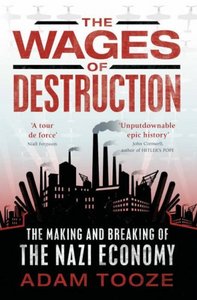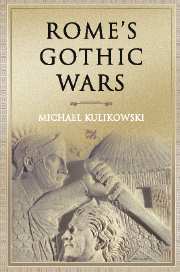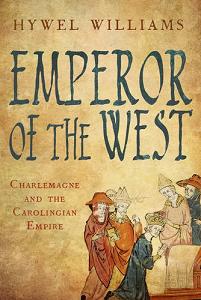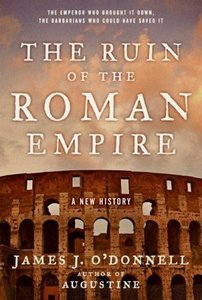I still own Chris Y. an answer to his comments about James J. O’Donnell’s The Ruin of the Roman Empire
Hmm… Haven’t read O’Donnell’s book yet- I shall get it got for me for Christmas- so take this with a pinch of salt, but I’m unconvinced, at least by your account, that Justinian could have done better if he’d stayed out of the west. Three points occur to me off the top of my head. Firstly, what is O’Donnell’s assessment of the impact of bubonic plague on the eastern empire during Justinian’s reign. It must have been hugely economically disruptive, even if we accept it wasn’t as bad as the 14th century outbreak. If we’re talking about conserving resources for later defense against eastern powers, the plague must have been a serious setback, western wars or no.
Secondly, the book I have read recently, this one, argues that the extent to which Romanitas was conserved in the west can be overstated. Wickham tries to use written and archaeological sources together, and he argues, powerfully to me at least, that the reduction in large scale trade brought about by the removal of the large scale state meant that economic activity in the west was quite different to how it had been during even the latest period of the western empire, with all the social and political consequences you would expect.
Thirdly, we have an example of what an emperor who took security on the eastern front as his priority could achieve in Heraclius, a couple of generations after Justinian. He faced an attack from Persia and won so decisively that the Sassanid state was effectively destroyed. The effect of that was that the Muslims were able to gave the Persian empire its coup de grace and then used their territories as a jumping off point to drive the Romans out of the middle east altogether. Could anything Justinian might have done prevented that? I’d be interested to hear an argument.
I’m not trying to denigrate O’Donnell’s work, which as I say I haven’t read yet, but I do think there’s an argument that in the long run Justinian’s western campaigns were pretty much irrelevant to the larger outcome.
Thoughts?
A couple of good points there. Now O’Donnell’s focus is firmly on the Western Empire, so he doesn’t go into too much detail about anything happening in the East other than how developments there impact on the west. He mentions the plague for example, but only in passing. O’Donnell is only interested in Justinian’s foreign policy so to speak, as well as the religious aspects of his rule, which does leaves some blind spots, the economic impact of the plague being one of them. It’s a weak spot in his thesis. But that doesn’t make it entirely invalid.
To tackle Chris’ third point first, the difference between Justinian and Heraclius is that the latter’s efforts were too late: the Roman and Persian Empires had exhausted each other with centuries of (intermittent) warfare and once a new “barbarian” challenge arouse with the Islamic jihad coming out of Arabia neither was strong enough to withstand it. Had Justinian been able and/or willing to have done the same, it would’ve given the East Roman Empire enough time to recover to perhaps have been able to beat the Arabian tribes. What’s more, one of the reasons that Islam could conquer the Middle Eastern provinces of the empire according to O’Donnell was the distance between the official Byzantine Christianity and the indigenous forms of it that flourish in Syria, Egypt and the other provinces. For the Coptic Church or the Nestorites rule of Islam was no worse than rule by Byzantium, sometimes even preferable as the former had less interest in hassling them.
On the economic side of things, O’Donnell’s beef with Justinian is that his western campaigns impoverished the Eastern Empire for little gain. As Chris notes in his second point, while the collapse of the Roman Empire is overrated, the fragmentation of it into its succesor states did mean a scaling down in trade, if only because traditional trading regions were now separate states… The western parts of the old Roman Empire had always been less wealthy than its eastern core, something that only became worse after the collapse. The wars themselves didn’t help either, depressing the economies of Italy and the other reconquered parts of the western Empire even further. All of which according to O’Donnell explains why the emperor started his reign with a surplus but ended it far in deficit. And Justinian set the trend for his succesors, trying to keep and expand their western holdings, when they did not have the resources to pursue both these goals and keep the Eastern Empire safe.
Could the Roman Empire have survived for longer had Justinian stayed east? It’s hard to say, but it might have left the east, the Byzantium part of it in better shape to survive the coming of Islam. In the west, had Justinian not invaded Italy, the Ostrogothic remnant empire there as founded by Theodoric, may have coalesed into something more akin to the Frankish kingdom — every historian so far I’ve read about Theodoric and his succesors have stressed that their was no reason to assume this could not have happened had the Ostrogoths been left alone. As I said in my original post, I’m certainly not entirely convinced by O’Donnell, but found that his greatest value lay in getting a fresh point of view on some familiar events.



